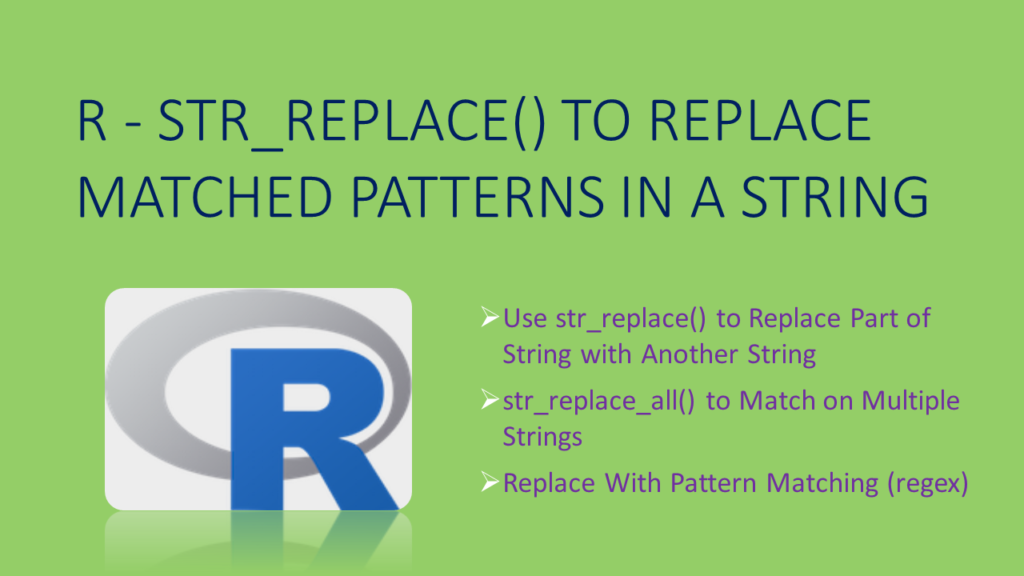R str_replace() and str_replace_all() are used to replace values of a string column based on matched patterns ( pattern matching with regex – regular expression), also used to replace with a specific string or character value. This function can be used on both DataFrame columns and a vector.
In order to use this str_replace() method, first, you need to load its library using library("stringr"). In case you don’t have this package, install it using install.packages("stringr"). The stringr package provides a set of functions to work with strings as easily as possible.
1. str_replace() Syntax
Following is a syntax of str_replace() method from stringr package.
# Syntax of str_replace()
str_replace(string, pattern, replacement)
str_replace_all(string, pattern, replacement)
- string: Character vector
- pattern: Pattern to look for
- replacement: A character vector of replacements. It can be a replacement string.
Let’s create an R dataframe and explore some examples using str_replace() method.
# Create DataFrame
df <- data.frame(id=c(1,2,3,4),
address=c('Orange St','Anton Blvd','Jefferson Pkwy','Main St'))
print(df)
#Output
# id address
#1 1 Orange St
#2 2 Anton Blvd
#3 3 Jefferson Pkwy
#4 4 Main St
2. Use str_replace() to Replace Part of String with Another String
str_replace() method from stringr package is used to replace a part of a string on column with another string or replace column with pattern matching. The following example replaces string St with Street on column address. Here, df$address is a vector. Note that every column in a DataFrame is a vector.
If you wanted to replace NA with Empty String in R dataframe use methods from dplyr package.
# Replace String with anotehr String
library(stringr)
df$address <- str_replace(df$address, "St", "Street")
print(df)
Yields below output.
# Output
id address
1 1 Orange Street
2 2 Anton Blvd
3 3 Jefferson Pkwy
4 4 Main Street
3. str_replace_all() to Match on Multiple Strings
Use str_replace_all() method of stringr package to replace multiple string values at a time on a single column. The following example takes vector c() with mapping of values to be replaced on address column.
# Replace multiple strings at a time
rep_str = c('St'='Street','Blvd'='Boulevard','Pkwy'='Parkway')
df$address <- str_replace_all(df$address, rep_str)
print(df)
Yields below output
# Output
id address
1 1 Orange Street
2 2 Anton Boulevard
3 3 Jefferson Parkway
4 4 Main Street
4. Replace With Pattern Matching (regex)
Since these methods are used on vector, let’s create a R vector and replace values in it with pattern matching. Since every column in a DataFrame is a vector, you can also use pattern matching on DataFrame columns.
# Create Vector
numbers <- c("one", "two", "three")
num <- str_replace(numbers, "[oe]", "-")
print(num)
# Output
[1] "-ne" "tw-" "thr-e"
Now let’s use str_replace_all() on the same example.
# Create Vector
numbers <- c("one", "two", "three")
num2 <- str_replace_all(numbers, "[oe]", "-")
print(num2)
# Output
[1] "-n-" "tw-" "thr--"
5. Conclusion
In this article, you have learned str_replace() and str_replace_all() methods from sringr package are used to replace part of a string from a column to another string. Also, these methods are used to replace the string with another string based on pattern matching.
Related Articles
- R – Replace Empty String with NA
- R – Replace NA with 0 in Multiple Columns
- R – Remove Rows with NA Values (missing values)
- How to remove a character with a string in R
- How to Replace Values in R with Examples
- R – Replace String with Another String or Character
- R dplyr mutate() – Replace Column Values
